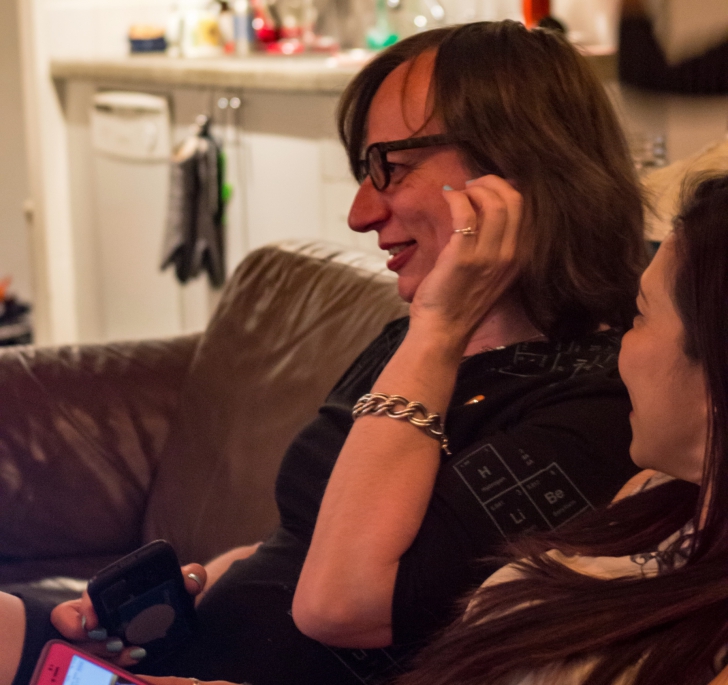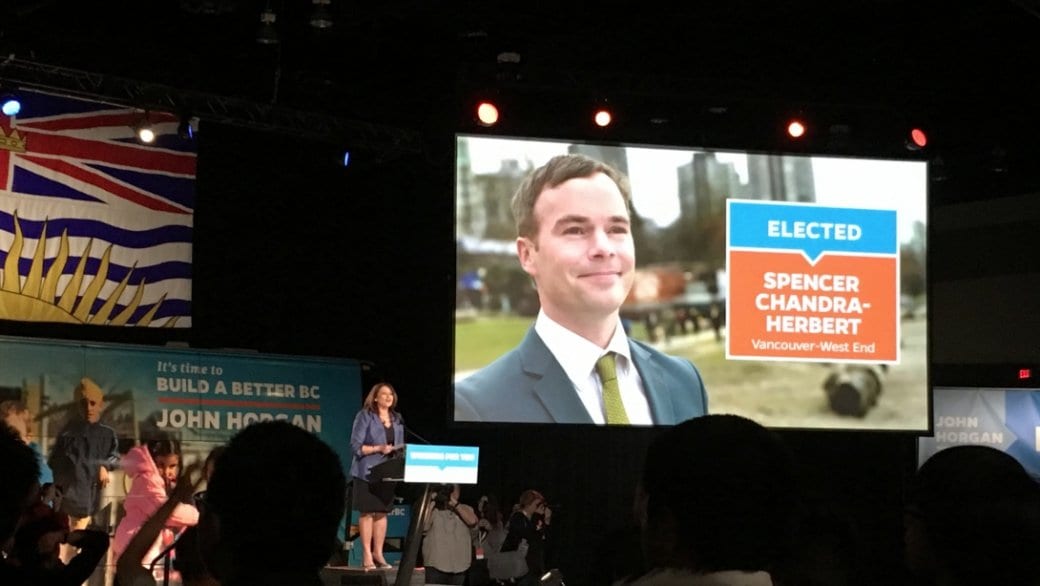Despite the record number of openly LGBT candidates running for seats in last night’s BC election, it looks like the same number of LGBT MLAs will head to the provincial legislature now as in 2013.
Of the 15 queer candidates — including four openly trans candidates — running for office with BC’s three main political parties, only the NDP’s five gay and lesbian incumbents were elected on May 9, 2017. Jennifer Rice (North Coast), Mable Elmore (Vancouver-Kensington), Mike Farnworth (Port Coquitlam), Nicholas Simons (Powell River-Sunshine Coast), and Spencer Chandra Herbert (Vancouver-West End) were all re-elected by wide margins.
The Green Party’s four LGBT candidates (Nicola Spurling, Ian Soutar, Veronica Greer, and Jennifer Holmes) and the BC Liberals’ two LGBT candidates (Nigel Elliott and Stacey Piercey) were all defeated.
Three queer NDP candidates were defeated as well: Sue Powell, Stephanie Goudie and Gerry Taft.
And the NDP’s groundbreaking trans candidate, Morgane Oger, was narrowly defeated in Vancouver-False Creek, where she lost to Liberal incumbent Sam Sullivan by just 560 votes after a very tight race that saw the lead see-saw between them for hours as the ballot boxes were counted.
It’s not yet known whether the final vote count (which includes as-yet-uncounted absentee ballots) will change the outcome in False Creek, or if the BC NDP will ask for a recount.
Should a final vote count favour Oger, the NDP could increase its seats in the legislature to 42, bringing the party into a tie with the BC Liberals, who currently hold 43 seats to the NDP’s 41 seats. On May 10, BC’s lieutenant-governor asked the Liberals to lead the new minority government, but final counts and/or recounts are still expected in at least four ridings, including Courtenay-Comox where the NDP candidate won by just nine votes. The final count begins on May 22, according to Elections BC.
Oger’s campaign has yet to speak or release a statement regarding Tuesday night’s results. If she is elected in the final count, she will become the first openly trans candidate elected in Canada.
Mable Elmore, the lesbian MLA re-elected to a third term in Vancouver-Kensington, was at the NDP’s election night rally. When she spoke to Xtra, Oger had a slight lead over Sullivan, and Elmore said she was watching that race closely because it would be “incredible” for LGBT British Columbians to see an openly trans candidate elected for the first time in Canada.

As for her own victory, Elmore says she’s happy with the results and promises to keep serving her constituents.
“My commitment, and John Horgan’s commitment and the BC NDP, we said we’re going to work on behalf people and that’s what our record is and that’s what I’m passionate about and that’s what I’ll be continuing to do,” she says.
In Vancouver’s West End, gay MLA (and proud new father) Spencer Chandra Herbert was easily re-elected with 61.2 percent of the popular vote.
“It feels incredible. In the West End, Coal Harbour, they spoke loud and they spoke clearly, and I’m incredibly humbled by their support,” he says.
This will be Chandra Herbert’s fourth term in the legislature, but he says he is not taking anything for granted. “I know I’ll just have to keep working harder every day and listen to all their voices.”
Chandra Herbert defeated gay Liberal contender Nigel Elliott by 7,612 votes.
Despite his re-election, Chandra Herbert says he experienced more homophobia on the campaign trail than in any previous election.
“I faced a lot of hate on the streets. People screaming out hateful things, more so than in any campaign I’ve faced so far,” he says.
Most of the invective had to do with him now being a father, he says, though he quickly notes that the number of constituents who congratulated him and his husband “speaks a lot to me about how incredibly accepting and loving the West End and Coal Harbour is. And that hate lost in a big way.”
Chandra Herbert says a minority government in BC will hopefully mean a government that listens to LGBT people.
“The Liberal majority government refused to listen to us until the public was so loud and deafening that they could do nothing but listen to us,” he says. “I hope that we’ll get a government that will actually listen to us without having to shout. That will act for us before we have to protest and that will be responsive to our needs.”
Mike Farnworth says he’s “thrilled beyond belief” by his re-election in Port Coquitlam, where he won by his largest margin yet.
He says having so many openly queer candidates “speaks to the fact that LGBTQ candidates are very much part of the mainstream political fabric of the province of British Columbia.”
Farnworth acknowledges it’s not yet clear what the new government will look like, but says a Liberal minority government should mean “there’s going to be no backsliding on human rights issues and equality issues.”
The BC Greens — having tripled their representation in the BC legislature from one member (leader Andrew Weaver) to three — now hold the balance of power between the Liberals and the NDP. They will likely play a pivotal role in what shape the new government will take.
Ian Soutar, one of four LGBT candidates running with the BC Greens this election, placed third with 2,553 votes in his riding of Coquitlam-Burke Mountain, where the Liberals’ Joan Isaacs narrowly beat the NDP by 170 votes (pending final counts). Soutar is pleased with the election’s overall outcome.
He alleges that Coquitlam-Burke Mountain’s outgoing NDP MLA Jodie Wickens was unresponsive to LGBT issues. “But now because it’s something the Greens are interested in, like myself, I can totally see where that party would have to collaborate with us to make sure [changes] happen,” Soutar says.
Although Green candidate Nicola Spurling did not win in her riding of Coquitlam-Maillardville, she increased her party’s percentage of the vote there from 8.7 percent in 2013 to 10.8 percent, and says she’s excited by the role the Greens will play going forward.
“I think the fact that we’ve managed to grow while the NDP has also grown has really dispelled a lot of those vote-splitting myths,” she says.
While the Liberals were neck and neck with the NDP in Coquitlam-Maillardville in 2013 (with both parties winning about 45 percent of the votes cast and the NDP narrowly taking the seat with just 41 votes), the Liberal candidate slipped to 38 percent of the vote this time and lost by nearly 2,500 votes.
Spurling says it’s hard to know what impact being outed as a transgender candidate may have had on her run for office, but says the positive messages she received afterwards were the highlight of her campaign.
“I received a ton of emails and Facebook messages from people across Canada and even around the world telling me how much they supported me, how inspired they were to see so many trans people in politics,” she says.
“I think Morgane’s campaign is a real testament to how well LGBTQ2+ candidates can do . . . I’m hoping that people won’t be dissuaded from getting involved in politics just because we didn’t have a trans person elected in this election.”

 Why you can trust Xtra
Why you can trust Xtra


